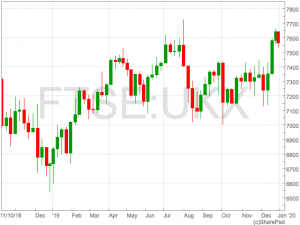
The FTSE 100 has closed 2019 up 12% following a Santa’s Rally through December.
Despite posting a fairly respectable gain of 12%, the FTSE 100 lagged behind major indices in Europe and the United States.
The German Dax rose 25% while the French CAC 40 added 26% in 2019.
In the United States, where markets are set to close later tonight, the Dow Jones is on for a 22% gain while the market capitalisation-weighted S&P 500 is heading for a 28% gain.
Factors such as a strengthening pound, uncertainty over Brexit and a disappointing years for oil companies BP and Shell, who account for a large proportion of the FTSE 100, can be attributed to the FTSE 100’s underperformance in 2019.
 The Winners & Losers
The Winners & Losers
Shaking off wider concern over the health of the high street, sportswear group JD Sports was 2019’s highest rising FTSE 100 share with a rise of 140%.
Aveva plc, an Information Technology group specialising in Cloud, IoT, AI and Virtual Reality solutions, was the FTSE 100’s second highest riser posting gains of 91%.
Both of the two top FTSE 100 risers had been promoted to the FTSE 100 from the FTSE 250 during 2019.
It was a close race to the bottom of the pile with Centrica and NMC Health down 34% and 35% respectively.
Centrica was set to take the crown of 2019’s worst performing share we it not for a short selling attack on NMC Health. Muddy Waters highlighted potential accounting irregularities at the middle eat focused health care group in late December which saw the group’s share price destroyed after which, up until that point, had been a relatively good year for them.
Of course NMC Health and Centrica are the FTSE 100’s worst performers in 2019 because they remain in the index, companies such as easyJet, Hikma Pharmaceuticals an Wood Group had been relegated to the FTSE 250 early in the year after a period of share price pressure.

